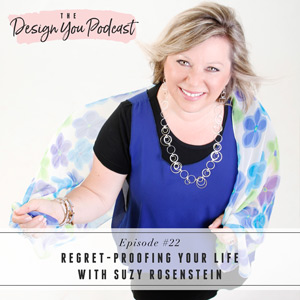
I have a feeling that my guest today is someone a lot of you listeners will relate to. Suzy Rosenstein worked in the public sector for years in a job that looked good on paper but wasn’t fulfilling her… until the Universe conspired in her favor and she was laid off. Suzy seized that opportunity to create her coaching business and start making her wildest dreams come true!
Suzy specializes in helping people to reach their full potential and regret-proof their lives. She seeks out people who are frustrated and know, in their heart of hearts, that there’s more. Sound familiar?!
We talked about pretty much everything important to us personally, as well as our businesses, but Suzy’s advice on regret-proofing every area of your life really speaks to me, and I hope it shines a light on your journey as well. If you’re feeling that life is passing you by, this episode is for you!





